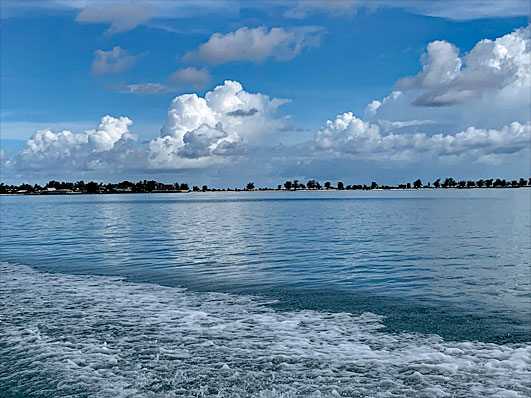Appraising, Processing and Preserving ProjectKiribati National Library and ArchivesTarawa, Kiribati June 12-17, 2023
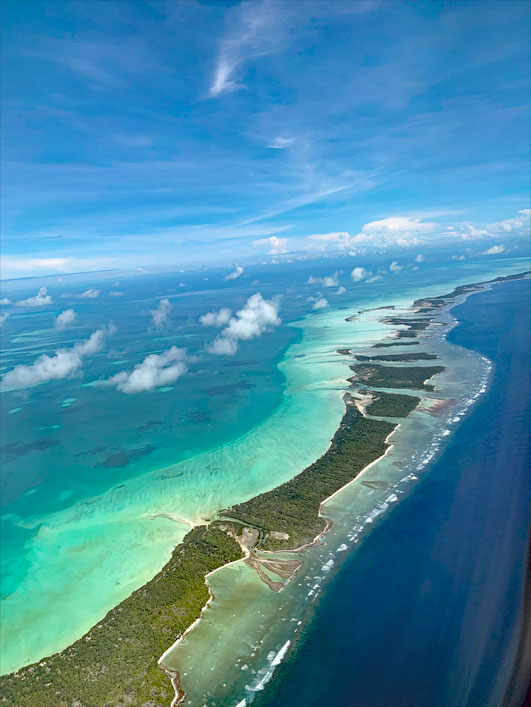
As my plane swerved towards the Tarawa Atoll, I couldn't help notice how large the lagoon was that separated the north and south Tawara islands. Indeed, I would later learn that it was about 190 square miles and could easily take over an hour to travel across the lagoon in a speedboat and three to four hours in a non-motorized boat. But flying loe over the lagoon you can see specks of islanders frolicking and fishing in its inviting, tranquil and turquoise waters.
It was a Monday, June 12, when my plane landed at the Bonriki International Airport. Fortunately, the motel that I was staying at had transportation to and from the airport, and I quickly made my way south to Bairiki in a car that seemed to have transmission issues. The ride would take about forty minutes, which was a little longer than expected. Already, I was delayed coming from Fiji, and so, I wanted to get to my motel, drop off my bags, and then make my way to the Archives, which was only about a ten-minute walk from the motel.
The Archive's staff was eagerly awaiting my arrival, and when I entered the reading room, I was pleased that the year and half of planning for this project had finally come to its climax. There were five archive staff members that were all going to work on the project throughout the week, which meant that archives services were going to be drastically cut. The Archives has a heavy stream of patrons during normal business hours coming to use mostly land records, and the five staff members typically spend their days helping these patrons. Nevertheless, the staff was ready to juggle between working on the project and helping patrons.
As soon as I stepped into the Archives I met the staff, which included, Senior Archivist- Teangiraoi Tebuka, Aileen Boubou, Tarome Roomi, Teaaka Raweaitina, and Kauriri Tokam respectively. I also met the director of the Library and Archives, Reetina Katokitaa. Together they showed me the small, first floor Archives building that included the repository and the backlog of records that we will be appraising, processing and preserving for the rest of the week. Because Kiribati has formal customs, we could not start the project (which they called a program) until a member of the Ministry of Education came to officially open up the program. The Ministry of Education was the governmental body that the Kiribati National Library and Archives fell under. Thus, for the rest of the day we worked on creating a program for the entire week ahead.
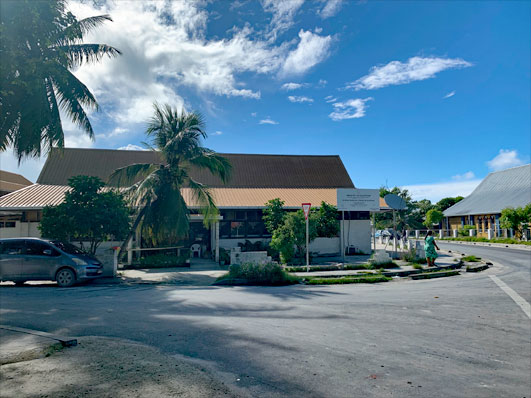
On Tuesday at 10 a.m. the Senior Assistant Secretary, Neeti Tabokai, of the Ministry of Education arrived at the Archives to officially open the project. Some short speeches and cheers were made. This was followed by a reception with food including Kiribati pizza. Once the formalities were finished we started work on the project. The staff had never learned the basic archival practices. Thus, they were excited at learning the process of appraising, processing and preserving records.
We decided to tackle the first shelf of the backlog of records, which happened to be records from the Ministry of Finance. I noticed that the Archives did not have a collection policy that would help with the appraising of records. They did have an Archives Act, which also needed updating. So, I took it upon myself to write a collection policy along with archival guidelines that will help with a new version of their act. I also decided to write processing guidelines to help guide them along after I left.
Most of the records from the Ministry of Finance were paper records from the 1980-1990s. Although they were probably too old too keep in the archives, the collection turned out to be a good group to learn from. The staff also believed that there were records that had actually been asked for in the past. So, we thought that they were worth keeping for the time being. Nevertheless, we were able to use some appraising techniques. Any items that were duplicates, publications, or not relevant to Kiribati were withdrawn. All the publications will eventually be sent to the librarian for review and possibly will be added to the library collection.
The next step was to preserve the items as best we can. We applied basic preservation techniques such as removing rusty paperclips and brushing any dirt from the records. We refrained from removing small staples because we felt that the repository's environment was stable and good enough to merit not taking the time to remove each staple. After cleaning the documents, we placed them in acid-free folders. However, if we believed that the original folder was acceptable, we kept the documents inside. All folders were then housed in new archival boxes.
Since there was no original order of the records, we were able to arrange and describe the contents in a way that made sense to the archives. We tried to place like records together in the same box and then tried to arrange chronologically. Box lists were created and typed, which will greatly help in finding the records.
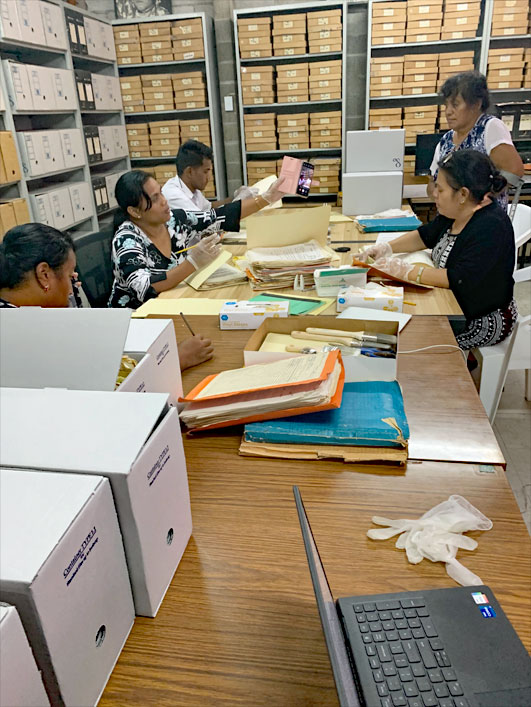
Although we finished the day by processing approximately eight boxes, the staff got a good feeling as to how to appraise, process and preserve records. In the following days they will be able to apply this knowledge and execute these basic archival functions even more thoroughly and quicker.
As we continued working on records from the Ministry of Finance on Wednesday, we were paid a surprise visit from Reetina Katokitaa, the Director of the Ministry of Education. She had been on leave and decided to come and see how the project was doing. We showed her what the archives staff was learning, which she thought was good. But, we got the feeling that she simply wanted everything digitized. I confirmed to her that not every record merits digitization. Besides, we first need to learn what we have in the backlog before we can start to do any digitization projects. It is undecided if the records that we were working on from the Ministry of Finance were going to be digitized. If so, they will most likely be towards the bottom of the list.
I had also noticed that the Archives contained a special collection of books on the Pacific Islands. As I did with the National Library, I donated my two books, Mr. Moonlight of the South Seas and The Darklands. Both books deal with topics of the Pacific Islands, and thus, will fit very well in the collection. The chief librarian and archivist, Teewata Aromata, was pleased to receive a copy of the books, as most of the collection in both the library and the archives was composed of donations.
The archives staff and I ended the day by processing twelve more box. This gave us a total of twenty boxes altogether. The staff was getting more comfortable and more experienced at processing records. They were also getting faster. I felt satisfied that the staff learned so quickly, which also gave me no doubt that they could continue the project after I left the island.
We started the day on Thursday by looking at the National Archives' photographs. The staff was all dressed in black in support for the battered women of domestic violence in Kiribati. This is something they do every Thursday. Nevertheless, They had a collection of about 200 photographs and postcards. This collection was quite small compared to other National Archives in the region. I showed them how to process the photographs, which was very similar to processing the paper records. They will be able to apply appraisal techniques to this collection, as many of the postcards and photographs are not relevant to Kiribati. Nevertheless, we did come across some very unique and historic Kiribati photographs that could be used for exhibitions in the near future.
At lunch time the staff and I decided to do something different. We journeyed to Betio Island for lunch. Betio was the last island in the southern chain where the infamous Battle of Tarawa took place in November of 1943 between American and Japanese forces. The three-day fight took many lives, and there are remnants of the battle today. Japanese pillboxes, bunkers, and artillery could be found still decaying in the intense island environment. The island is only about two miles long and a half-mile wide, which simply added to the battle's ferocity. After lunch, we visited the American and Japanese memorials and drove past Red and Green Beach where the Americans landed.
After we returned from Betio, we finished processing a few more boxes before calling it a day and closing the archives. The archives group love to sing and dance, and after we closed the doors for the day they couldn't help but to engage in a rousing round of karaoke. Most of the songs were in the Kiribati language, but there were a few English ones as well. I got the feeling that they do this often at the close of the day before heading home.
On Friday I spent the first three hours of the morning conducting a disaster preparedness workshop for both archives and library staff. There were about ten people participating in the workshop and we examined the preparedness, response, and recovery stages of a disaster. The participants then learned how to write a disaster preparedness plan by incorporating ten steps to guide them along in writing the plan. A couple of exercises on risk assessment and vital records were utilized during the workshop. At the very the end the participants received a hands-on training on the techniques for recovering and salvaging waterlogged material. This hopefully gave them an idea what records are like when they are wet.
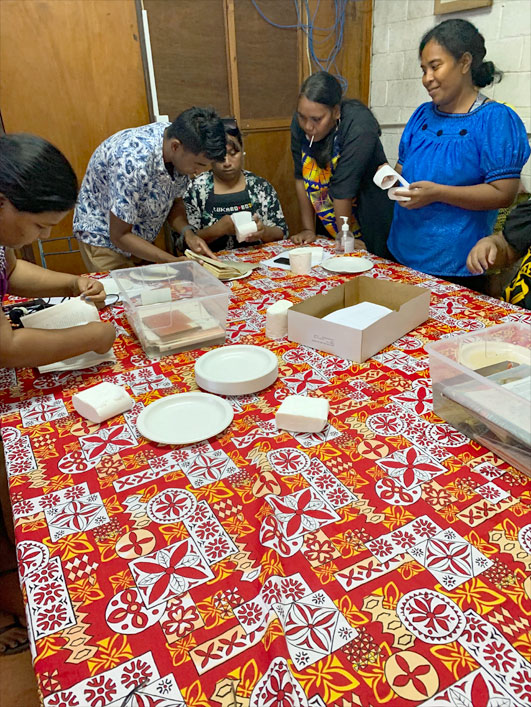
After the workshop, I finished writing the guidelines and the collection policy. The staff also processed a few more boxes in the afternoon. Then, we got ready for the closing ceremony.
Throughout the week there were frequent power outages that would last for two minutes to two hours or more. On Friday at 3pm the power went out and by the time the closing ceremony took place after 5pm the building was still without power. But this didn't dampen anyone's spirit.
The closing ceremony took place in the library and all archives and library staff was invited. They even invited some of the dignitaries of the Ministry of Education. In fact, the Deputy Secretary, Birati Tirlon and the Honorable Alexander Teabo, Minister of the Ministry of Education graced us with their presence. Kimberly Aromata, daughter of chief librarian, Teewata Aromata, performed a few traditional dances. The dances were then followed by speeches from the Chief Librarian, Deputy Secretary, the Minister, and myself. The archives and library staff also performed another dance. Finally, the formalities were then concluded with a feast of traditional Kiribati food.
Overall, I believe the project was a success. We accomplished much in the week despite interruptions from formalities, patrons, and frequent power outages. By the end of the week we processed and preserved approximately 30 boxes of records. We even appraised and weeded a few piles of records that were not relevant to the National Archive of Kiribati. The staff received some basic training in archival techniques, which was very much appreciated especially because it is very difficult to get such training being in an isolated country with limited resources and funding. We also examined the National Archives' photograph collection and looked at ways to appraise and process the small group of photos and postcards. And finally, I conducted a very important disaster preparedness workshop for both the archives and library staff. Because the library and the archives are in two separate buildings, the disaster preparedness committee will have to compromise and plan to safeguard staff and collections in two places. Nevertheless, with the completion of the workshop, they should now have the tools to be proactive and write a dynamic plan.
Once again I would like to properly thank all those who have made this project possible and a success. I would like to acknowledge the Kiribati Ministry of Education for accepting and allowing the project to take place. Of course, a very special thank you goes to the Kiribati National Library and Archives staff for being quite appreciative and supportive during the project. I would also be remiss without thanking our financial supporters that included: the International Council of Archives Fund for the International Development of Archives (FIDA), Island Culture Archival Support (ICAS), and President, Jared Chou, along with the rest of the members of the Polynesian Archival Support Club of Valencia High School in Placentia, California. This generous, international collaboration was truly the backbone that made this project achieve its goals and fostered a vital and exemplary partnership.
